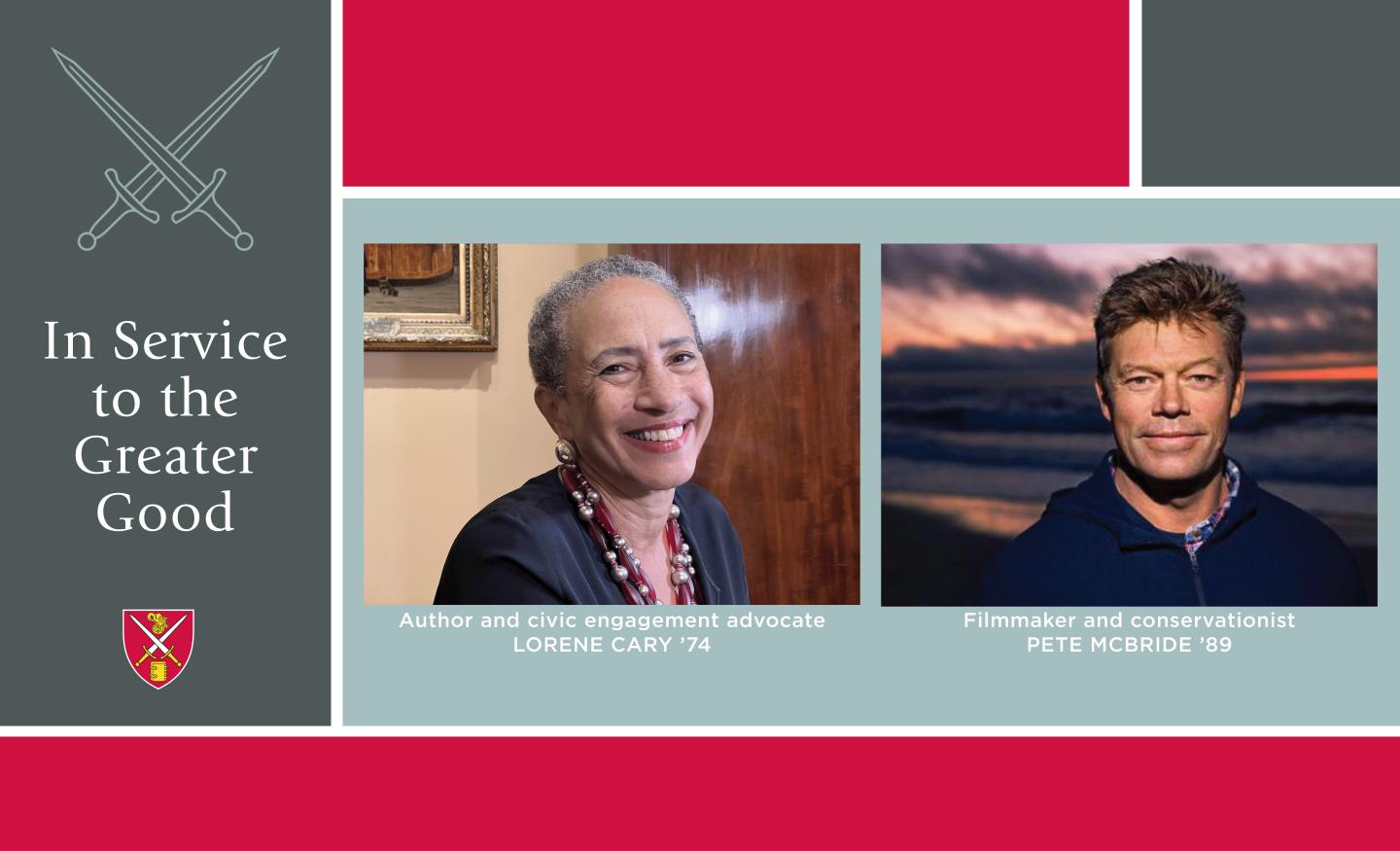

A conversation about living a life in service to the greater good with Lorene Cary ’74 and Pete McBride ’89.
BY KRISTIN DUISBERG
A professor of fiction and nonfiction at the University of Pennsylvania for 25 years, in 2018 Lorene Cary ’74 created #VotethatJawn — an initiative through which her students write blogs, articles and social media content to bring voting-age youth in Philadelphia to the polls. A photographer and filmmaker for National Geographic, Pete McBride ’89 has spent two decades documenting planet Earth and humans’ impact on it. On the evening of Tuesday, Feb. 21, these two St. Paul’s School graduates joined Rector Kathy Giles and student co-host Pierce Trevisani ’25 in an online conversation about their work as artists and activists and the powerful role creativity can play in living a life of service.
Cary was a member of one of SPS’s earliest forms to enroll girls following the School’s move to coeducation in 1972, and was among the first Black girls to graduate. While she “wrote and wrote and wrote at St. Paul’s School,” Cary matriculated at UPenn as a premed student, “determined to become a doctor.” In her classes, however, she found herself inexorably drawn to the stories behind the lab samples she was working with, and she recounted the experience of realizing that the 12-year-old boy whose blood she was analyzing would likely die within six months.
“I kept saying, ‘I have to be tougher.’ Writing was sort of a fallback for me,” she explained. “I didn’t respect it … but it was where I lived.” Cary’s first book was “Black Ice,” a memoir about her years at SPS that was published to much acclaim in 1992 and continues to be taught in high schools and colleges three decades later. She has subsequently published a second memoir, three novels, a play, a collection of stories for young readers and an opera libretto.
McBride similarly found his creative spark at SPS — in a sculpture class. A Dartmouth graduate and Knight Journalism Fellow at Stanford, he first worked in newspapers, and fell into visual storytelling on an assignment on which he did his own photography. As a self-taught photographer and videographer, one of his first projects entailed documenting the reenactment of a 1920 plane flight from London to Cape Town, South Africa. The 58-day flight across the African continent in an open-cockpit plane established McBride’s reputation as “a foolish young guy [who] would do anything” and led assignments on Mount Everest, in Antarctica and more. The Colorado native was a decade into his career when an assignment in his backyard — documenting a friend’s kayak trip down the Colorado River — underscored his craft’s power to highlight social and environmental issues.
The river that for 6 million years had flowed into the Pacific Ocean “had dried up a hundred miles shy of the sea at that point. … [and] I just couldn’t understand why I didn’t know that,” he said. “I’d learned to fish in it. I’d learned to swim in it. Why was this story not on the front pages or on CNN?”
For McBride, who has traveled on assignment to more than 75 countries, produced documentaries about the Colorado River, the Ganges River and the Grand Canyon and released three books of his photographs, the power of his work is in being an eyewitness to climate change and having the opportunity to advocate for places and communities that don’t have a voice. For Cary, it lies in leveraging her success as a best-selling author to create opportunities and amplify the ideas of others in the Black community, whether that means centering art events in Black neighborhoods or supporting her students’ drive to tell stories that would inspire their peers to vote — the genesis of #VotethatJawn.
“My own art was not the activism, but it led me to it,” she said of the stories she’s written about slavery and slave escapes, Black lynchings and her own experiences as a woman of color. “The writing for me is a luxury in these other, civic structures that feel like activism.”
During the hourlong event, both Cary and McBride had the opportunity to share a sampling of their work. Cary provided the online audience as well as students who had gathered for a watch party in the Friedman Community Center’s Raffini Commons with a trailer for her play, “My General Tubman,” in which Harriet Tubman shows up in a modern-day Philadelphia prison to recruit men to fight alongside her in the Civil War. McBride shared several images from his 2021 book “Seeing Silence,” a visual exploration of some of Earth’s least-populated places, and recounted experiences that included swimming with orca whales in Norway and witnessing the calving of a glacial ice arch in Antarctica.
As with previous panels, the discussion concluded with a question about what advice these alumni would give their high school-aged selves. McBride said he’d tell himself to be confident in who he was, and in his differences, and to recognize the incredible opportunities that surrounded him. Cary offered a poignant answer about self-forgiveness, noting that a reader had asked her the same question at a reading a day earlier. Giles closed the evening with a promise that there are more conversations about service to the greater good forthcoming.
Did you miss the event? You can watch a video of the full conversation here.
